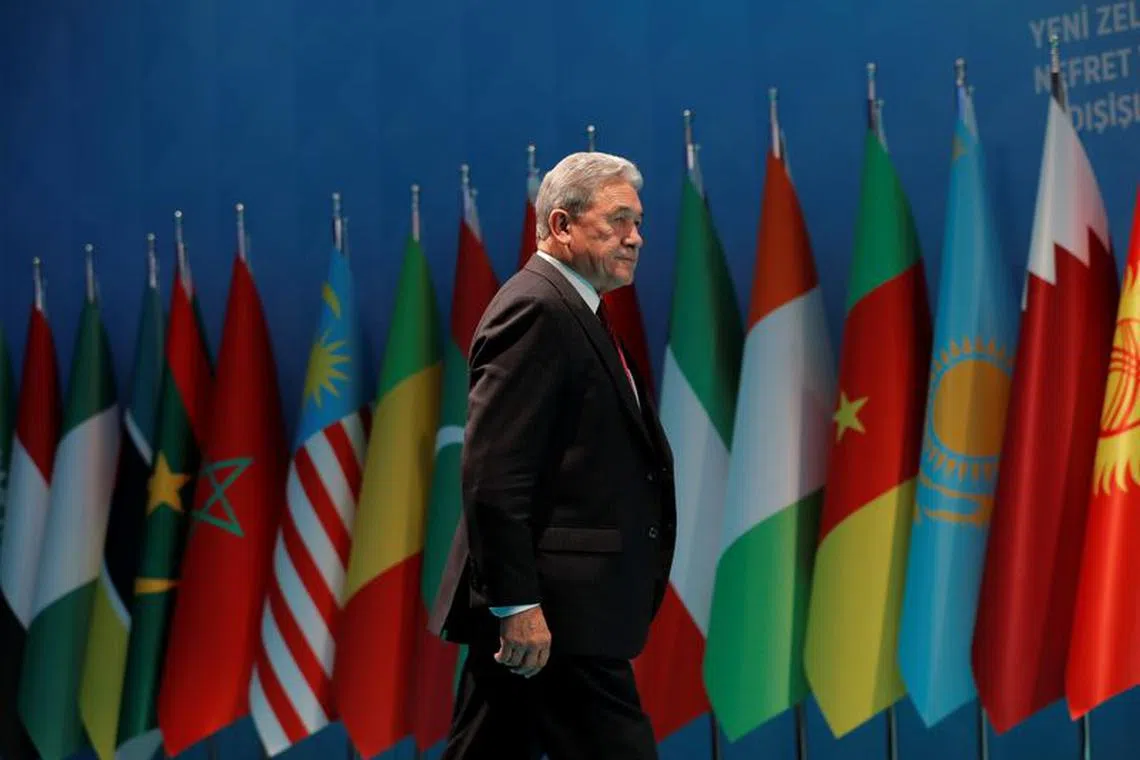New Zealand’s National Party inks coalition deal; Winston Peters, David Seymour to share DPM role
Sign up now: Get insights on Asia's fast-moving developments

Populist NZ First party leader Winston Peters is New Zealand's new foreign minister.
PHOTO: REUTERS
WELLINGTON - New Zealand’s National Party formally signed an agreement to form a new coalition government on Nov 24, more than 40 days after the election.
The role of deputy prime minister will be split between populist NZ First party leader Winston Peters and ACT party leader David Seymour.
National Party deputy leader Nicola Willis, 42, will be finance minister and Mr Peters, 78, will be foreign minister, the three parties said in a joint statement.
“Despite the challenging economic environment, New Zealanders can look forward to a better future because of the changes the new government will make,” National leader and incoming Prime Minister Christopher Luxon said in the statement.
The new Cabinet, which will be sworn in on Nov 27, is a combination of veteran politicians and new leaders.
The role of deputy prime minister, a key sticking point in coalition negotiations, will be split between Mr Peters and Mr Seymour.
Mr Peters will hold the position first before passing the baton to Mr Seymour, 40, halfway through the government’s three-year term.
It could prove to be a volatile mix, with Mr Peters and Mr Seymour having shown a willingness to trade barbs in the past.
Earlier in 2023, Mr Seymour described Mr Peters as “the least trustworthy person in New Zealand politics”.
The pair had another famous spat on social media in 2020, culminating in Mr Peters telling Mr Seymour: “I reckon you’d last 10 seconds in the ring with me”.
But on Nov 24, they were eager to put their old animosities to bed, with Mr Peters saying the two had “shaken hands” and were learning to trust each other.
Mr Luxon, 53, was keen to hose down suggestions of friction between the two, saying the government would be “using the talents of both of these leaders”.
“We’ve done something historic. We actually have three parties in a coalition government,” he told reporters at Parliament.
“The fact that they have 18 months each is important. I’m looking forward to working with both of them.”
The coalition revealed a series of policy changes that the coalition government will undertake, including narrowing the remit of the Reserve Bank Of New Zealand (RBNZ).
Mr Luxon said the government will amend the RBNZ Act 2021 to remove the dual mandate on inflation and employment, to focus monetary policy only on price stability.
“The Reserve Bank will be properly focused on doing the job it should have been doing for the past three years,” said Mr Seymour at a news conference following the announcement.
The coalition will also repeal a ban on offshore oil and gas exploration that was introduced by the previous Labour government, it said.
The new government will cut personal income taxes, following through on a campaign policy used to woo middle income voters struggling with rising costs of living.
However, plans to open up New Zealand’s housing market to foreign buyers and tax these purchases to pay for the cuts have been shelved.
“Delivering tax relief is just one part of the government’s plan to rebuild the economy. The government will ease the cost of living, reduce wasteful spending, and lift economic growth to increase opportunities and prosperity for all New Zealanders,” Mr Luxon said.
The parties said they plan to “rewrite the Arms Act”, and agreed to train no fewer than 500 new police.
Mr Peters – a colourful, populist figure – will be taking over as foreign minister for a third time after serving in the role in Ms Jacinda Ardern’s 2017 Labour-led government under and with Labour Prime Minister Helen Clark in 2005.
“Foreign affairs does matter to this country.... all relationships do matter to this country,” Mr Peters said in a joint news conference in the capital Wellington after the announcement.
“We expect the Chinese government to treat us the same way, regardless of our size, as we treat Niue. Size doesn’t matter, respect does,” he said when asked how he plans to deal with China’s growing influence in the region. REUTERS, AFP


